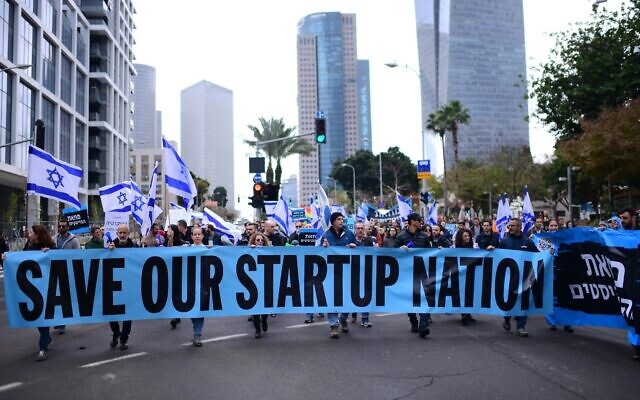Israeli high-tech startups and companies raised $1.68 billion in capital from investors in the third quarter of this year, a decline of 38 percent compared with the same period in 2022, according to a report compiled by research center IVC and LeumiTech, a Leumi banking arm that specializes in banking for tech companies.
Capital raised by Israeli tech companies from July to September of this year was down only 14% from the $1.93 billion in funds nabbed during the second quarter of this year, and remained almost unchanged versus the first quarter, pointing to first signs that the downward trend in investment is stabilizing, preliminary data presented in the IVC-LeumiTech Israel tech review report showed.
Full quarterly data of the Israeli tech sector is expected to be released in October.
So far this year, Israeli tech firms have raised about $5.3 billion. That’s after attracting more than $15 billion in capital last year and, during a bonanza funding year in 2021, nabbing $25.6 billion in private investments in total leading to high company valuations. However, in the second half of 2022, investments in private companies slowed amid rising interest rates, a global stock market fall and tech layoffs.
Adding to this is the local political uncertainty around the contentious judicial overhaul announced earlier this year, which has been pushing foreign investors into a wait-and-see position about dealmaking. As a result, raising money has been much more difficult in a jittery market exacerbated by the local political upheaval.
Sign up for the Tech Israel Daily
and never miss Israel’s top tech stories
By signing up, you agree to the terms
The number of deals in the third quarter dropped 41%, with 85 transactions recorded during the period compared with 143 year-on-year. Dealflow during the reported quarter was the lowest in terms of the number of deals since 2017, according to the IVC-LeumiTech data.
Tech workers march in Tel Aviv to protest against the government’s planned overhaul of the judicial system, January 31, 2023. (Tomer Neuberg/Flash90)
“We continue to see in the third quarter data, the first signs of stabilization in the amount and scope of funding rounds, data that bring us back to the levels of 2018-19,” said LeumiTech CEO Maya Eisen Zafrir. “In addition, we recognize a stabilization in the rate of follow-on investments, an indication that the companies are beginning to adjust their value to the new interest rate environment.”
“Although there is still a decline in initial investments (early rounds) – it is more moderate to what we saw compared to previous quarters,” Eisen Zafrir noted.
Mega deals above $200 million each have become a sort of outlier in the last few quarters, with only one deal in the third quarter of 2023, the report showed. Cato Networks, a maker of cloud-based, secured networks for large enterprises that lets remote workers connect to applications regardless of where they are, raised $238 million in funding at a company valuation of more than $3 billion.
Moreover, the data pointed to a positive development for startups raising seed funding which rose for the first time in the third quarter, after five consecutive quarters of declines. Local startups attracted $143 million from seed funding rounds in the July to August period, an increase of 34% compared with the $107 million raised during the second quarter of the year, but the figure is still down 57% year-on-year.
The local tech sector relies heavily on foreign capital, largely American. In the third quarter of this year, the presence of foreign investors, which is reflected in the amount of transactions carried out by investors who are not in Israel, decreased slightly compared to the second quarter, and supports the emergence of a stabilization trend, according to the IVC-LeumiTech.
Overall, about 319 foreign investors participated in funding rounds in the third quarter versus 355 in the previous quarter and 478 during the same quarter in 2022. That compares with 236 Israeli investors pouring money into local high-tech firms in the July to September period versus 259 in the second quarter, and 467 during the corresponding three months in 2022.



